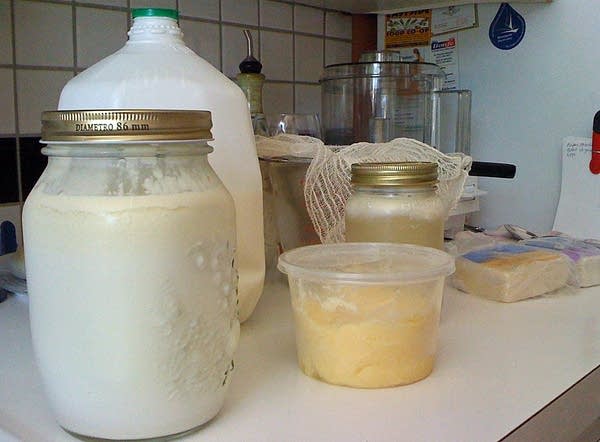Raw milk advocates worry about crackdown after E. coli outbreak

Consumers of raw dairy products are worried about a crackdown, after four people got sick from drinking unpasteurized milk tainted with E. coli.
Minnesota law allows farmers to sell their raw milk occasionally and directly at the farms where it's produced. But many people buy raw dairy products at underground drop sites.
One Minneapolis couple are regular customers -- Susan Allyn and Gary Beaver.
At first glance, the dairy products on the kitchen counter in their home look like they came from the refrigerated aisle of the local grocery. But these products are different.
Create a More Connected Minnesota
MPR News is your trusted resource for the news you need. With your support, MPR News brings accessible, courageous journalism and authentic conversation to everyone - free of paywalls and barriers. Your gift makes a difference.
"We have raw milk, and then we have a jar of raw milk yogurt that we made from this milk," said Susan Allyn.
In about six hours, the yogurt sitting atop a cheesecloth will be thick and creamy, like European yogurt.
"I love the yogurt. I drink the raw milk, too, but I love yogurt," she said.
Allyn is lactose intolerant. For at least 20 years, she avoided consuming dairy products because of the painful stomach trouble it caused.
But all that changed last year, when she and her husband learned about raw milk. Now, she eats raw dairy products all the time, because she says the raw milk's bacteria help her body digest it.
"Raw milk is not safe. It is a naturally hazardous product."
Most major health organizations, including the Food and Drug Administration and the Centers for Disease Control and Prevention, say raw milk carries the risk of disease -- because it is unpasteurized.
The pasteurization process, which was invented more than a century ago, uses heat to kill bacteria, including E. coli.
Last week, four people got sick with E. coli after drinking unpasteurized milk that state officials traced to Hartmann Dairy in southern Minnesota, also known as M.O.M.s.
One of the four victims is a toddler who was hospitalized with life-threatening illness. Two other victims were hospitalized and released, and the fourth was not hospitalized.
The owner of the dairy, Michael Hartmann, said in an interview that he believes he's being targeted for his history of fighting regulation.
In 2001, the Department of Agriculture revoked his license to sell Grade A milk after inspectors found unsanitary conditions at his dairy. He has also tangled with the state in court over other food safety issues.
Hartmann said he doubts the Health Department's evidence that the tainted milk came from his farm. But state officials say there is no question that his farm was the source.
Minnesota Department of Health epidemiologist Richard Danila says the victims became sick after an incubation period of three to five days.
Danila says he's concerned about the growing trend of people consuming raw dairy products. He likens it to parents questioning the need to vaccinate their children for diseases that have already been eradicated in the U.S.
"'We don't see these diseases anymore so why do we need to vaccinate children?' It's very analagous to that. 'Why do we have to drink milk that has been pasteurized? milk is safe,'" said Danila. "In fact, raw milk is not safe. It is a naturally hazardous product. It simply needs to be pasteurized for it to be safe."
Danila says even the cleanest dairies cannot avoid all possibilities for contamination. After all, animals are animals. But advocates point to other countries where people consume raw dairy as proof that it's safe.
Nine states in the U.S. allow retail sales of raw milk, and 19 states -- including Minnesota -- allow only direct farm sales.
For convenience, many people in the Twin Cities use "drop sites," where the dairy products dropped off by farmers are kept cool and waiting for customers.
The sites range from individual homes to public areas, but no one MPR spoke to would reveal any locations.
Farmers who use the sites in violation of the law risk $1,000 fines and possible criminal action.
Health officials say the penalties are steep because drop sites increase the chances of contamination.
Some farmers who produce and consume raw dairy agree.
Central Minnesota farmer Richard Radtke says even though most farmers use safe practices, drop sites are risky.
"It's another person handling something with more potential for contamination, I believe," Radtke said. "Is refrigeration correct? Someone's got to go get the milk, someone's got to store the milk. I do believe it should be picked up at the farmers."
Radtke and his family drink raw milk, and he credits raw dairy with improving his daughter's asthma.
Back in northeast Minneapolis, Susan Allyn and Gary Beaver say they'll continue to use drop sites because it's more convenient than driving hours each way to pick up their milk.
The couple, who both come from farm families, acknowledge that poor handling of raw dairy could introduce health risks. But they are confident their drop site is safe.
Allyn says if the state cracks down, they'll fight.
"This has touched us both very deeply, and we will do whatever politically that we can do," said Allyn. "We have contacted our senators more in the last year than I have in the rest of my entire life about food safety issues."
State agriculture and health officials continue their investigations into Hartmann Dairy Farm.
